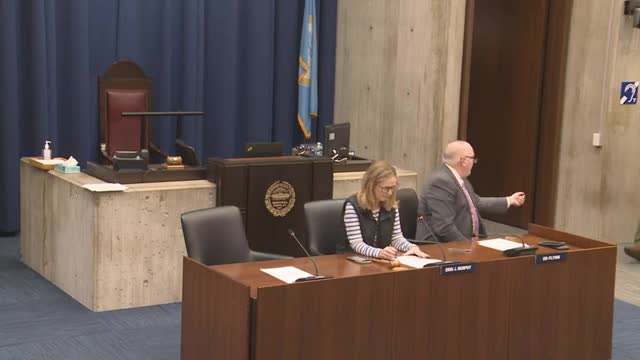Boston hearing on $145,687.72 VAWA STOP grant focuses on Spanish‑language advocate and coverage gaps
Get AI-powered insights, summaries, and transcripts
Subscribe
Summary
Boston City Councilors heard testimony Feb. 26 on a city message (Docket 0293) authorizing acceptance of $145,687.72 in federal VAWA STOP funding to pay salary, fringe and overtime for a Spanish‑speaking civilian domestic violence advocate covering Jamaica Plain and East Boston and to support overtime for advocates citywide.
Boston City Councilors heard testimony Feb. 26 on a city message (Docket 0293) authorizing acceptance of $145,687.72 in federal funding from the U.S. Department of Justice’s Office on Violence Against Women (OVW), passed through the Massachusetts Executive Office of Public Safety and Security, to fund one full‑time civilian domestic violence advocate and overtime for citywide advocates.
The grant, officials said, will pay salary, fringe and overtime costs for one OVW‑funded advocate who is Spanish‑speaking and assigned to cover Jamaica Plain and East Boston; it also underwrites overtime to provide coverage in districts that lack a dedicated advocate. The matter was sponsored by Mayor Michelle Wu and was referred to the committee on Jan. 29.
Why it matters: Committee Chair Erin Murphy said the grant supports survivors’ access to services. Councilors pressed police officials about language access for immigrant survivors, gaps in district coverage, the city’s reliance on federal grants for staffing and what would happen if federal funding were suspended.
Jenna Savage, deputy director of the Boston Police Department Office of Research and Development, described the award as "a really phenomenal grant for us because it does support 1 full time civilian domestic violence advocate," and said the position is one of five citywide advocates. Lieutenant Detective Nicole Lapointe, assigned to the department’s domestic violence unit, explained that the advocates sit in district stations, make initial contact with victims after reports, provide safety planning and “give victims another avenue to seek resources, that's separate and distinct from the criminal justice system.”
Officials provided data on the unit’s workload: the domestic violence unit was assigned roughly 13,000 reports in 2024; advocates logged contact with more than 10,000 victims and provided services to more than 3,000 new victims last year. The department said it currently has 12 detectives in the domestic violence unit (16 sworn positions including supervisors) and five civilian advocates across the city.
Coverage and gaps: Police described how advocates are distributed: the VAWA‑funded advocate (named in testimony as Maria Perry) covers Jamaica Plain and East Boston. Two advocates are funded in the operating budget (one covering West Roxbury/Roslindale/Hyde Park, another covering Mattapan). Two additional advocates are funded by a COVID‑era grant that is scheduled to end June 30; one of those covers Roxbury and the other covers Dorchester and South Boston. Department staff said District 4 (Back Bay, South End, downtown) currently does not have a dedicated, in‑station advocate and that A1 and D4 stations do not host a resident advocate, although the advocates provide coverage by phone and by overtime shifts.
Language access and immigrant survivors: Councilors emphasized language access for Cantonese, Mandarin and Spanish speakers. Savage and Lapointe said about 15% of victims are non‑English speaking, that advocates frequently use text, phone and letters to reach people and that the department uses partners such as Casa Myrna (statewide DV hotline), ATASK (Asian Task Force Against Domestic Violence), AFAB (Association of Haitian Women in Boston), Fenway Health and other community providers for culturally specific services and interpretation. Councillor Flynn said, “I think it's extremely important” to have language access; a councilor requested consideration of a Cantonese‑speaking advocate for Chinatown and other neighborhoods where Cantonese is widely used.
Immigration and legal referrals: Officials stated the department does not ask survivors about immigration status and that advocates refer possible U Visa cases to legal services; the U Visa program was discussed as an avenue for some undocumented survivors who assist with criminal investigations. Lapointe said referrals are made to legal partners who help with the process; the department declined to provide individual victim information and said community partners sometimes connect survivors who are willing to share testimonials with councilors.
Training and partnerships: Police said advocates complete domestic violence curriculum through the Massachusetts Police Training Council (MPTC) and that department detectives and advocates coordinate with the district attorney’s victim services advocates and other nonprofit partners. Housing shortages were identified repeatedly as a major barrier to safety planning when victims need to leave an abusive residence.
Sustainability concerns: Multiple councilors raised the risk that federal grants could be reduced or suspended. Savage said the city is monitoring federal communications and working with the finance cabinet; staff named Lisa O’Brien as leading internal efforts to secure operating‑budget funding for advocates. Councilors asked the administration to seek operating‑budget positions so that services are not dependent on short‑term grants.
Next steps: The hearing record will remain open for written comment to the committee email. Committee members asked department staff to provide additional budget and grant‑status information, including which domestic violence positions are currently funded by time‑limited COVID grants and the city’s plan for transitioning federally funded advocates to the operating budget if possible.
Votes or final action: The Feb. 26 session was a committee hearing on Docket 0293; committee testimony was taken and questions were posed, but the transcript includes no recorded committee vote or final authorization on the message during the hearing.
